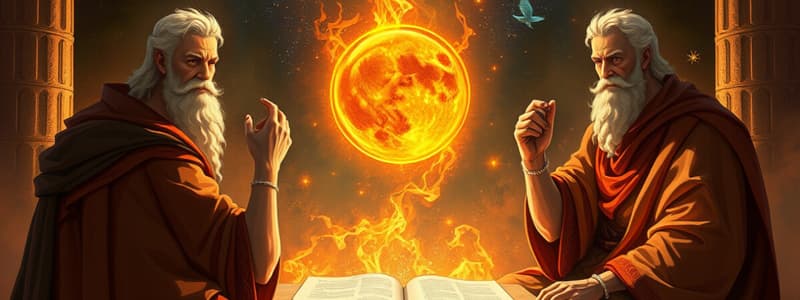Podcast
Questions and Answers
What is the concept that connects the ideals in the transcendental realm to the perceptions in the material world?
What is the concept that connects the ideals in the transcendental realm to the perceptions in the material world?
- Isolation
- Participation (correct)
- Reflection
- Inhibition
Which concept is considered the pinnacle or highest essence in Plato's philosophy?
Which concept is considered the pinnacle or highest essence in Plato's philosophy?
- Justice
- Truth
- Beauty
- The One or Good (correct)
What process involves understanding individual ideas and then their relationships to other ideas?
What process involves understanding individual ideas and then their relationships to other ideas?
- Deductive reasoning
- Syllogistic reasoning
- Inductive reasoning
- Dialectic reasoning (correct)
Which type of reasoning is primarily focused on the separation and classification of ideas?
Which type of reasoning is primarily focused on the separation and classification of ideas?
What fundamental issue does the Problems of Universals address?
What fundamental issue does the Problems of Universals address?
What is the basis for the truth in mathematics, according to the discussed philosophy?
What is the basis for the truth in mathematics, according to the discussed philosophy?
What does the term 'dialectics' refer to in the context of ideas?
What does the term 'dialectics' refer to in the context of ideas?
What method is primarily used for organizing lower ideas under higher ideas in Plato's philosophical approach?
What method is primarily used for organizing lower ideas under higher ideas in Plato's philosophical approach?
What did Plato synthesize from Parmenides and Heraclitus regarding knowledge?
What did Plato synthesize from Parmenides and Heraclitus regarding knowledge?
According to Heraclitus, why is it impossible to possess absolute knowledge?
According to Heraclitus, why is it impossible to possess absolute knowledge?
What does Plato classify as the characteristics of the realm of thought?
What does Plato classify as the characteristics of the realm of thought?
How did Plato view the relationship between essence and perceptible things?
How did Plato view the relationship between essence and perceptible things?
What core belief did Socrates uphold that Plato incorporated into his dialectics?
What core belief did Socrates uphold that Plato incorporated into his dialectics?
What is one of the implications of Parmenides's view that change is an illusion?
What is one of the implications of Parmenides's view that change is an illusion?
What is meant by 'Essence' in Plato's classification of categories?
What is meant by 'Essence' in Plato's classification of categories?
What distinguishes the 'real world' from the 'realm of thought' in Plato's philosophy?
What distinguishes the 'real world' from the 'realm of thought' in Plato's philosophy?
Flashcards are hidden until you start studying
Study Notes
Dialectics and Dualism in Philosophy
- Plato, influenced by Socratic thought, asserts that "Virtue is knowledge," establishing a basis for his theory of knowledge.
- Synthesizes views from Parmenides and Heraclitus, which underlie the concepts of dialectics and metaphysics.
- Heraclitus emphasizes permanence in change with the notion "No Man Can Step in the Same River Twice," suggesting that all things are in a constant state of flux.
- Plato grapples with the implications of change, leading to the conclusion that true knowledge can only pertain to things that are unchanging and knowable through reason rather than sense perception.
- Parmenides argues that change is impossible, contending that nothing can arise from nothing, thereby rejecting the reality of change and asserting a singular, unchanging essence.
Essence and Ideas
- The distinction between categories arises from understanding essence, which embodies the essential characteristics of a category.
- Plato’s realm of thought (Parmenidean) is unchanging and infinite, while the material world (Heraclitean) is finite and in flux.
- Prior to inhabiting physical bodies, souls are believed to exist in an ideal realm, familiar with the true forms of things; this memory informs recognition when perceiving reality.
- Plato identifies a limited number of forms or essences that underpin the material world, referring to these as "ideas" or "forms."
- The "One" or "Good" is the highest category from which all others derive, leading to the true essence and ultimate knowledge.
Problems of Universals and Mathematics
- The philosophy of universals posits that particulars require universals to derive meaning, connecting individual entities to overarching concepts.
- Mathematics exemplifies absolute truths grounded in reason, cementing its role as a key framework for understanding.
- Dialectics, defined as the science of ideas, involves the accurate association and categorization of concepts.
- Understanding the relationship between ideas is presented as the primary aim of philosophy, encapsulating both inductive and deductive reasoning.
Processes of Understanding
- The two-step process of knowledge acquisition:
- Inductive reasoning involves understanding each idea independently.
- Deductive reasoning focuses on the interrelation between ideas through classification and division.
- Classification organizes subordinate ideas under higher categories, while division often utilizes dichotomies to clarify concepts.
- The supreme idea, the Good, represents the ultimate perfection among all ideas, serving as a guiding principle in philosophical inquiry.
Studying That Suits You
Use AI to generate personalized quizzes and flashcards to suit your learning preferences.




